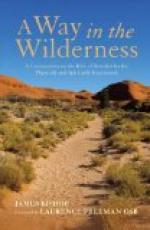If the lynx is a big one, and very hungry, as he generally is in winter, you may get some unpleasant impressions of him in another way when you venture far from your fire. His eyes blaze out at you from the darkness, just two big glowing spots, which are all you see, and which disappear at your first motion. Then as you strain your eyes, and watch and listen, you feel the coals upon you again from another place; and there they are, under a bush on your left, creeping closer and blazing deep red. They disappear suddenly as the lynx turns his head, only to reappear and fascinate you from another point. So he plays with you as if you were a great mouse, creeping closer all the time, swishing his stub tail fiercely to lash himself up to the courage point of springing. But his movements are so still and shadowy that unless he follows you as you back away to the fire, and so comes within the circle of light, the chances are that you will never see him.
Indeed the chances are always that way, day or night, unless you turn hunter and set a trap for him in the rabbit paths which he follows nightly, and hang a bait over it to make him look up and forget his steps. In summer he goes to the burned lands for the rabbits that swarm in the thickets, and to rear his young in seclusion. You find his tracks there all about, and the marks of his killing; but though you watch and prowl all day and come home in the twilight, you will learn little. He hears you and skulks away amid the lights and shadows of the hillside, and so hides himself—in plain sight, sometimes, like a young partridge—that he manages to keep a clean record in the notebook where you hoped to write down all about him.
In winter you cross his tracks, great round tracks that wander everywhere through the big woods, and you think: Now I shall find him surely. But though you follow for miles and learn much about him, finding where he passed this rabbit close at hand, without suspecting it, and caught that one by accident, and missed the partridge that burst out of the snow under his very feet,—still Upweekis himself remains only a shadow of the woods. Once, after a glorious long tramp on his trail, I found the spot where he had been sleeping a moment before. But beside that experience I must put fifty other trails that I have followed, of which I never saw the end nor the beginning. And whenever I have found out anything about Upweekis it has generally come unexpectedly, as most good things do.
Once the chance came as I was watching a muskrat at his supper. It was twilight in the woods. I had drifted in close to shore in my canoe to see what Musquash was doing on top of a rock. All muskrats have favorite eating places—a rock, a stranded log, a tree boll that leans out over the water, and always a pretty spot—whither they bring food from a distance, evidently for the purpose of eating it where they feel most at home. This one had gathered a half dozen big fresh-water




